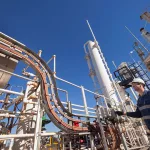Flagship oil producers in China are preparing to ramp up multi-billion dollar capital spending plans squeezed amid a Beijing probe into industry graft, offering a lift for oil services firms that suffered from belt-tightening in the first half.
State-controlled majors PetroChina and Sinopec delayed investing in project launches in the first half as China’s government deepened its corruption investigation in the state sector. Project tendering in China has been riddled with graft amid a culture of officials at state firms accepting bribes to award contracts to companies run by relatives or friends.
Oil industry executives say the probe hasn’t ended but may have peaked, having ensnared at least 11 former senior executives at PetroChina and its parent company China National Petroleum (CNPC). That’s enough to trigger new spending at the majors as they switch focus to meeting operational targets.
The oil services business is one of many sectors roiled by President Xi Jinping’s anti-corruption drive. While the clampdown may hurt state spending in certain areas in the short term, analysts say it would help the economy in the long run, boosting transparency in tendering and boosting major independent service providers’ chances of winning projects.
“The crackdown bodes well for mid- to long-term development of the economy as it would undermine state monopolies and improve investment efficiency,” said Zhu Jianfang, an economist with CITIC Securities in Beijing.
Over the past 12 months PetroChina, the country’s dominant oil and gas producer, and CNPC were at the center of one of the biggest corruption investigations into the Chinese state sector in years. PetroChina’s first-half spending fell 16 percent year on year to 91 billion yuan ($15 billion).
It attributed the drop to its efforts to “optimise its investment structure and reasonably adjusted the pace of construction of projects”, but reiterated its target is to spend 297 billion yuan this year – down 7 percent from 2013.
“INTERIM PHENOMENON”
“The oil services sector is being affected by the recent spending in the industry,” Wang Dongjin, PetroChina vice chairman and president, said at a results briefing last week. “But this is an interim phenomenon.”
Sinopec, Asia’s largest refiner by capacity and also engaged in oil exploration and production, has said it will cut expenditure by 4 percent to 162 billion yuan this year, and reported a 25 percent drop in capex in the first half. It vowed to “step up” investment in major producing projects in the second half.
A spending rebound would help the state-owned oil services businesses, including CNPC and Sinopec’s oil services arms – which dominate the industry – as well as legions of privately controlled firms.
Half of the about 20 major mainland or Hong Kong-listed Chinese oilfield service suppliers – most of which are privately-controlled entities – posted sharply lower profits, or even losses, for the first half.
Anton Oilfield, Petro-king, Shandong Molong and Kingdream all took a first-half pounding, reporting 80-85 percent skids in interim earnings. Sichuan Renzhi and Tong Oil posted losses, with Renzhi blaming it on Sinopec’s increased recycling of drilling fluids – one of its core products.
But some companies predict an imminent recovery as PetroChina and Sinopec invest more in upstream projects. “The spending slowdown was just temporary,” said Peter Pi, an executive with Anton, in whichSchlumberger NV holds a nearly one-fifth stake.
“The industry will recover in the near future in a much more healthy way and with more open market bidding,” Petro-King said in its interim earnings report.
SOURCE: http://www.cnbc.com/id/101965281#.






























